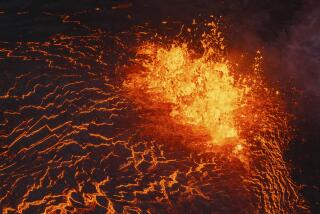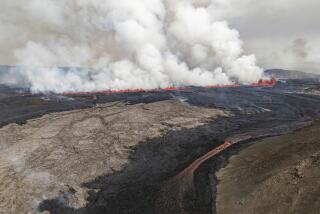Volcano Erupts Again; Thousands More Flee
- Share via
MEXICO CITY — The Mexican government swiftly evacuated thousands more people Tuesday from homes near the Popocatepetl volcano as the behemoth erupted for a second day, hurling molten rocks the size of beach balls into the air.
Authorities said they were on “maximum alert” Tuesday afternoon because a series of tremors in the volcano indicated that a vigorous new eruption was likely. But officials said their greatest concern was that the red-hot rocks spewing from the 17,887-foot volcano would melt a glacier on its flanks, sending torrents of mud and water toward nearby towns.
Since Monday night, the mountain known locally as “Popo” has erupted three times, in its greatest activity in more than 400 years. The volcano, just 40 miles southeast of Mexico City, the capital, is considered capable of producing devastating explosions.
Although the volcano has shot debris as far as six miles, most of the glowing stones and rubble have fallen near the crater. No injuries or deaths have been reported.
Still, the government was taking no chances. It continued busing people out of villages near the volcano Tuesday, with 30,000 evacuated by midday.
“This is not over. It’s likely it will continue for some days with the eruptions,” President Vicente Fox said Tuesday as he visited a shelter in Cholula, 65 miles southeast of the capital, where he was mobbed by worried evacuees.
Mexicans have been transfixed by the dramatic explosions at Popocatepetl, a volcano steeped in Indian legend. National television networks provided hours of live coverage, from the radiant fireworks of Monday night to the calmer scenes Tuesday of a 2-mile-high plume of ash and vapor puffing from the mountain.
Though Mexico City hasn’t been affected by the eruptions, newsboys strolled through traffic in the city Tuesday hawking tabloids featuring a photo of Monday’s explosion. The screaming headline: “RUN!”
Authorities said such alarm was unnecessary. But they became concerned when an explosion at 2 a.m. Tuesday tossed burning rocks in the direction of a glacier on the volcano’s western side. Another eruption occurred just after 6 a.m.
“In case of a thaw [of the glacier], there would be a high-risk situation, because mud and water could begin to flow through the ravines toward different towns,” Interior Minister Santiago Creel said.
People living near the glacier had been evacuated and the army was patrolling the towns, he said.
Roberto Quaas, head of the national disaster-prevention agency, told The Times that the glacier is about 100 acres, with ice 65 feet deep. Even if only 5 or 10 feet of the ice’s depth melted, the result could be a powerful torrent.
Scientists say that mudslides on volcanoes such as Popocatepetl can actually be far more dangerous than flows of lava, which tend to move more slowly.
Authorities said Tuesday that nearly all the population within a 7-mile radius of the volcano had been evacuated and that they were beginning to move residents living up to 12 miles away. About half the 30,000 evacuated so far have been lodged in temporary shelters set up by the government.
Early Tuesday, Fox flew by helicopter to two shelters, inspecting rows of cots covered with olive-green army blankets and sitting with evacuees breakfasting on beans and rolls. He was besieged by residents begging for assistance.
“What happened last night was an alarm. We’re scared,” one woman told Fox.
“Don’t take any risks, huh?” he responded, urging residents to stay put.
Some didn’t heed the president’s advice.
In San Nicolas de los Ranchos, just eight miles from Popocatepetl’s crater, villagers visited their homes Tuesday after fleeing in terror the night before.
“We know the danger we face. But our belongings are all our family has. It’s not easy to abandon everything,” said Pedro Sanchez, a 27-year-old peasant. He had returned temporarily to feed his family’s five cows, horse and three sheep.
Authorities plan to introduce incentives to keep people from returning to at-risk villages, such as a work program in which residents would be paid for helping with the evacuation.
U.S. volcano experts praised the Mexican authorities for their careful monitoring of Popocatepetl and the precautions they have taken.
“They’re doing a great job. This is the best-monitored volcano in the Western Hemisphere,” said Randall White, a volcano seismologist with the U.S. Geological Survey in Menlo Park, Calif.
Because the wind has been blowing away from the capital, Mexico City has been spared the clouds of ash that have bedeviled it in the past.
But authorities of the city government and airport were carefully watching the volcano’s activity. As a precaution, United Airlines canceled three flights Tuesday morning to Los Angeles, San Francisco and Washington, D.C., because of the eruptions. They were the only international flights affected.
More to Read
Sign up for Essential California
The most important California stories and recommendations in your inbox every morning.
You may occasionally receive promotional content from the Los Angeles Times.










